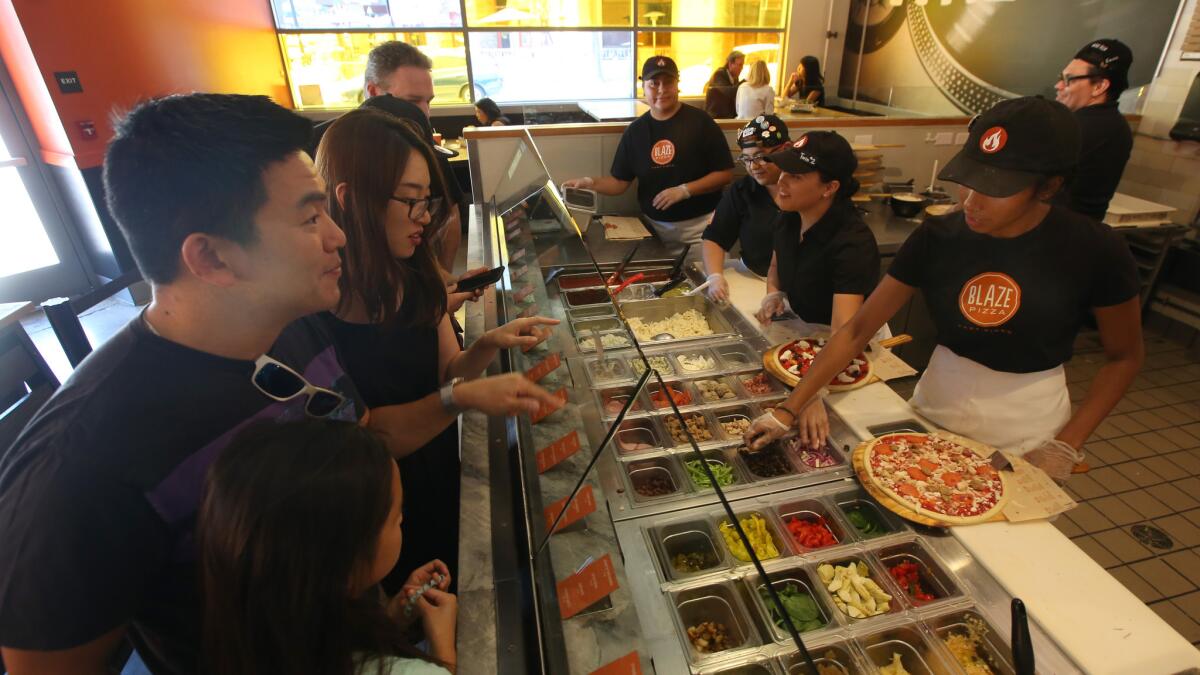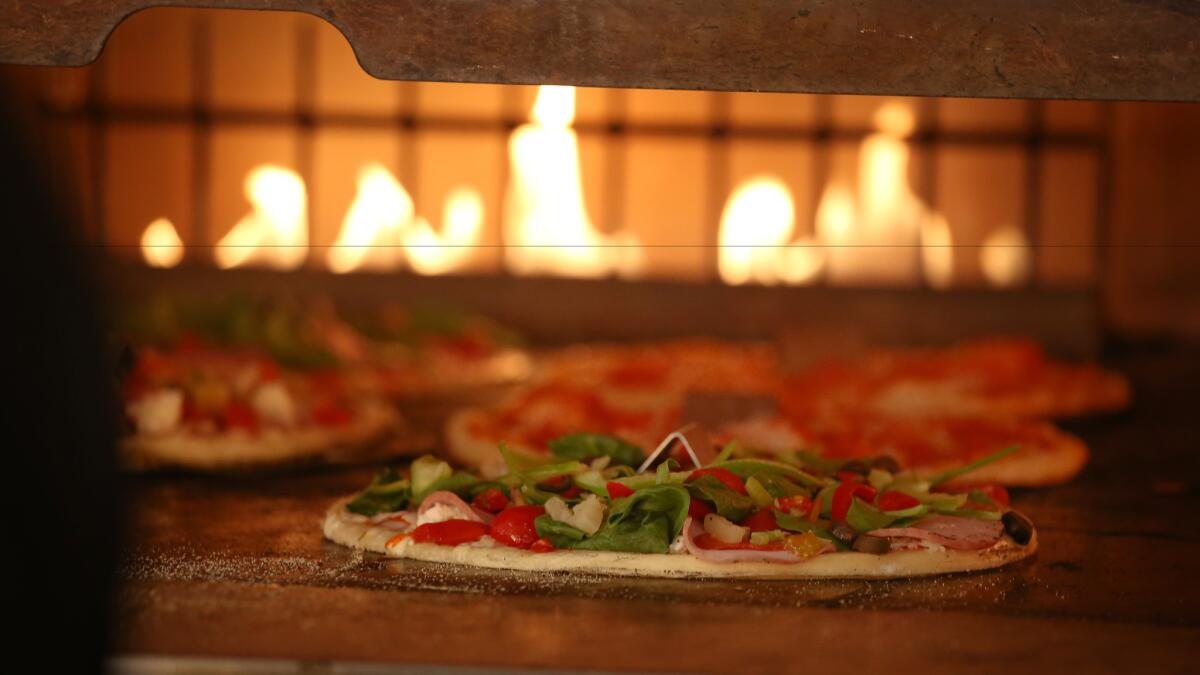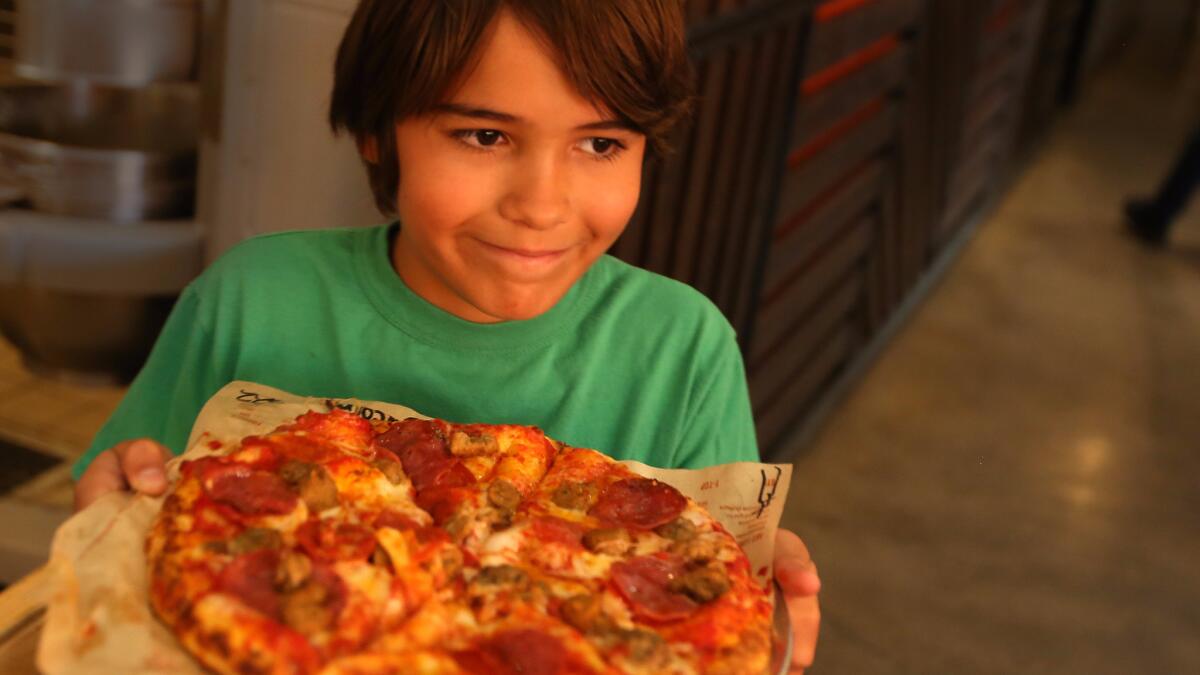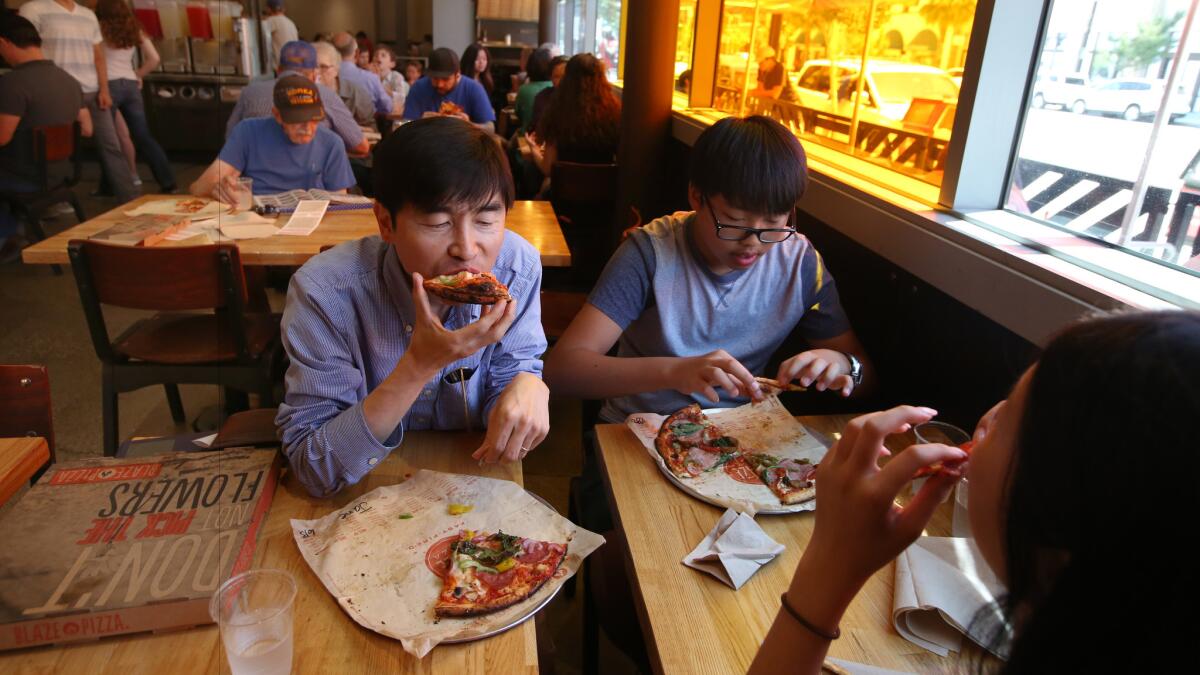Blaze Pizza quickly grew to 150 stores. Now it wants to serve the nation

- Share via
The spark for Blaze Pizza came after a quest for a quality pizza joint in Pasadena ended at Chipotle instead.
Elise and Rick Wetzel, the pie hunters in question, were surprised that the only choices in their town in 2011 were sit-down eateries or takeout chains. That’s when the pair had a brainstorm for a do-it-yourself pizzeria — a sort of Chipotle by way of Italy.
“We were there and we realized, “Why can’t we do this to pizza?’” Rick said. “We just sort of looked at each other and said ‘We’re going to do this.’ ”
The Wetzels had the know-how – Rick is co-founder of the mall staple Wetzel’s Pretzels — to make it happen. Since launching in 2012, the chain has rapidly expanded to 150 locations, with 350 more slated to open by 2020.
Blaze was the fastest-growing restaurant chain in 2015, according to research group Technomic. Now it’s poised to become the first among a new breed of pizza parlors to go truly national.
That comes with its own challenges. Blaze Pizza is facing fierce challenges from other upstart pizza chains eager to grab a slice of the pie. And unlike its chief rivals, the company is growing by relying almost 100% on franchising – which allows for speedy expansion, but could lead to issues of consistency and quality later, analysts said.
These quickly spreading pizzerias use a made-to-order model that was first popularized by Subway and then adopted by Chipotle. The trend toward more healthful, customizable food has already spawned chains with fresh takes on salads, burritos and burgers.
Now it’s pizza’s turn.

“It’s kind of a no-brainer,” said Lauren Hallow, concepts analyst at Technomic. “We had better burger and better sandwich, now we have better pizza.”
So-called better pizza chains are a booming portion of the $40-billion pizza industry — long dominated by neighborhood joints or national chains such as Pizza Hut, Domino’s, Papa John’s and Little Caesars.
As a centuries-old food, pizza was ripe for reinvention. Pizza chains themselves haven’t really seen innovation beyond mobile apps that enable takeout or delivery orders. Recent advances in technology have created super-hot ovens that can cook pies in mere minutes — equipment that upstart chains have adopted from the get-go.
Pizza is “an old and worn-out cuisine that can be upscaled just slightly,” restaurant consultant Aaron Allen said. If you “can serve it fast and updated for millennials, it’s a billion-dollar category.”
The potential market is huge: About 40% of Americans eat pizza at least once a week, and 90% nosh on a pie once a month, experts said. The only food that Americans love — and eat with more frequency when dining out — is burgers.
Old stalwarts like Domino’s said they aren’t worried.
“Their customer bases appear to be those who are looking for a great quick meal during their lunch breaks and are eating on premise,” the company said in an email. “Our core audience orders from us during dinner, later in the evenings, on weekends and during major televised events.”
But in just a few years, fast-casual pizza has taken off; last year, three of the five fastest-growing restaurant chains in the U.S. were fast-casual pizza concepts, according to Technomic. That includes MOD Pizza and Pieology, based in Rancho Santa Margarita.
Blaze Pizza is leading the fold. Sales hit $101 million in 2015, triple that of a year earlier.
The concept is simple: Diners either pick one of Blaze’s signature pizzas (with the option to customize anything on it) or build one themselves. Workers spread sauce and sprinkle toppings on pre-made and rolled dough, then pop it into a $33,000 oven with three-sided flame that can get temperatures up past 900 degrees. Three minutes later, it’s done.
From its start, the Wetzels said they had ambitions to become a national chain. Early investors they brought on include producer John Davis, LeBron James and Maria Shriver.
With their background in the pretzel business, the husband-and-wife duo knew that having the groundwork in place was crucial to expansion. They found a national flour distributor at the beginning, and also had spices that go into sauces prepackaged before heading to restaurants.

“The real key to going from 100 to 500 [stores] is layering in the pieces of support infrastructure,” said Jim Mizes, chief operating officer of Blaze. “That’s where a lot of young brands fall down.”
Franchising helped fuel Blaze’s four-year growth spurt. Forty-four franchise partners came aboard, with each getting separate territories. Blaze operates only six company-owned stores — the newest opened Friday in Disney Springs.
Joe Stein, a former chief financial officer at Carl’s Jr., is a franchisee in control of the Inland Empire. He has six Blaze locations open and two more slated for next year.
Stein said he considered other chains, but went with Blaze because he was impressed by the concept and the corporate support. The company provided training, including on-site help for two weeks after opening to whip the staff into shape.
Franchisees are now looking to fast-casual, Stein said. “It’s hard to find a space where there isn’t a Taco Bell or burger chain,” he said. “There’s growth in this category.”
But franchising comes with its own set of potential problems.
Quality can be hard to control, and rapid expansion can eventually cripple a company — Quiznos, for example, was forced to file for bankruptcy protection in 2014 after its roughly 5,000 U.S. stores proved unwieldy. Franchisees can also push back against any new strategy or direction that headquarters wants to push through.
Chipotle has opted to avoid franchising to keep a tight rein on quality and culture (though that didn’t stop the company from getting mired in a disastrous food safety scandal last year).
“Franchising can topple really, really quickly,” Allen said. “Franchisees are like rambunctious children — they think they know best.”
That’s why Blaze’s two main competitors have opted for a different path.
MOD Pizza is choosing to go with mostly company-owned restaurants. Out of its roughly 150 eateries, only 18 are franchise-owned. Chris Schultz, senior vice president of operations, said MOD wants corporate restaurants to comprise about 75% of total stores.
The Bellevue, Wash., company has been able to finance the strategy by raising about $106 million in funding.
“It is cash intensive,” Schultz said. But the upside -- tighter control over quality and the ease of tinkering with innovations -- makes the expense worthwhile, he said.
“For franchises, we are not asking them to do anything we are not doing in our stores,” he added.

Pieology wants a mix of 25% corporate restaurants and 75% franchises. The company, which has “huge backing” from the founders of Panda Express, also plans to expand by consolidation, founder Carl Chang said. Pieology has already acquired Project Pie this year. Chang said having corporate-owned stores ensures more profits down the line (franchisees often give corporate roughly 5% of revenue).
For the Wetzels, they are confident that their strategy of sprinting out in front of the competition will pay off in the end.
“I ran out and planted a bunch of flags,” Rick said. “It was a little harrowing. But what you own in the customer’s mind is very important.”
ALSO
Lazarus: Rejected for credit? Newfangled scores may be to blame
Grocery strike averted: Workers reach tentative deal with Ralphs and Albertsons
More to Read
Inside the business of entertainment
The Wide Shot brings you news, analysis and insights on everything from streaming wars to production — and what it all means for the future.
You may occasionally receive promotional content from the Los Angeles Times.











